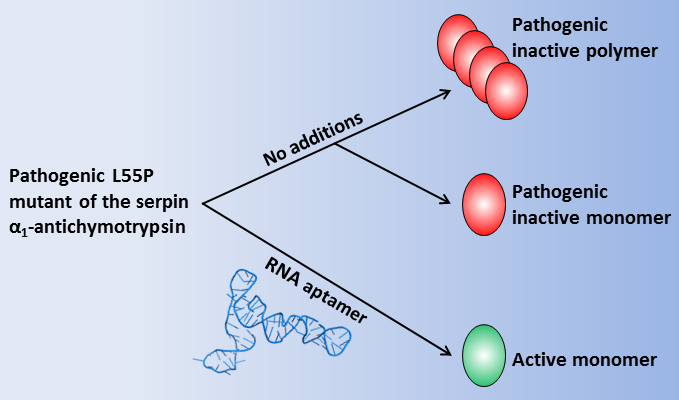A new way for prevention of pathogenic protein misfolding
Incorrectly folded proteins can cause a variety of diseases. Danish researchers have found a solution for preventing this misfolding.

Several diseases occur when mutations cause misfolding of proteins. These include ”serpinopathies” which is a group of rare heritable diseases. They are caused by mutations of so-called “serpin” inhibitors of proteolytic enzymes involved in blood coagulation, tissue remodeling, and other important physiological functions. The mutations cause misfolding, which results in an inactive serpin and hence overactivity of the corresponding proteolytic enzyme.
The exact symptoms depend on which serpin is misfolded. The best known serpinopathy is ?1-antitrypsin deficiency, which causes liver cirrhosis and lung emphysema. But also other serpins may misfold, for instance anti-thrombin and C1 inhibitor, leading to thrombosis and hereditary angioedema, respectively.
A long standing problem has been that agents preventing misfolding also inhibit the anti-proteolytic functions of the serpins. Working with a mutant of the serpin ?1-antichymotrypsin, a group of Danish researchers has now designed a way of preventing misfolding while leaving the anti-proteolytic effect unabated. The ?1-antichymotrypsin mutation is associated with chronic obstructive pulmonary disease (COPD).
The researchers have developed an RNA aptamer, which prevents misfolding and polymerisation of the ?1-antichymotrypsin mutant and does not interfere with its ability to inhibit the target proteases, i.e., cathepsin G and chymotrypsin. One perspective is that similar strategies may be employed by other proteins prone to misfolding.
The results have been published in Cell Chem. Biol. An RNA aptamer preserving full activity of a pathogenic serpin mutant. Madsen, J.B., Andersen, L.M., Dupont, D.M., Trelle, M.B., Johansen, J.S., Jensen, J.K., Jørgensen, T.J.D., and Andreasen, P.A. (2016) Cell Chem. Biol. (link to article).
The work was done in a collaboration between scientists from the Department of Molecular Biology and Genetics, Aarhus University, and the Department of Biochemistry and Molecular Biology at the University of Southern Denmark. The project, headed by Peter A. Andreasen, has been supported by the Danish Research Council for Technology and Production with DKK 14.1 million. The project has already resulted in several biochemical and structural biology publications, but with the article in Cell Chem. Biol., the main purpose of the project has been accomplished.
For further information, please contact
Professor, dr. scient. Peter A. Andreasen
Department of Molecular Biology and Genetics
Aarhus University, Denmark
pa@mbg.au.dk – mobile: +45 2899 2589
